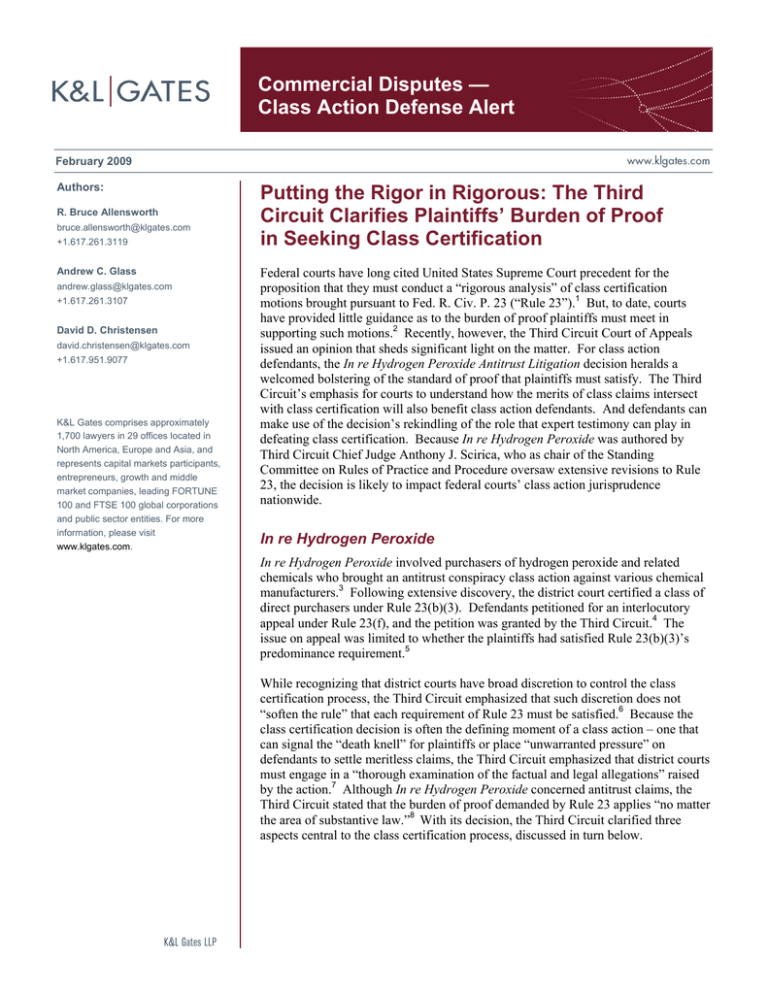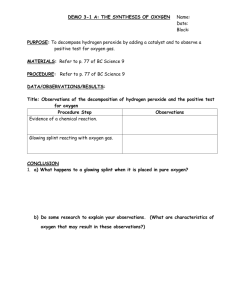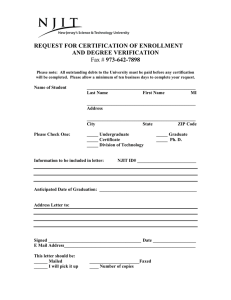
Commercial Disputes —
Class Action Defense Alert
February 2009
Authors:
R. Bruce Allensworth
bruce.allensworth@klgates.com
+1.617.261.3119
Andrew C. Glass
andrew.glass@klgates.com
+1.617.261.3107
David D. Christensen
david.christensen@klgates.com
+1.617.951.9077
K&L Gates comprises approximately
1,700 lawyers in 29 offices located in
North America, Europe and Asia, and
represents capital markets participants,
entrepreneurs, growth and middle
market companies, leading FORTUNE
100 and FTSE 100 global corporations
and public sector entities. For more
information, please visit
www.klgates.com.
Putting the Rigor in Rigorous: The Third
Circuit Clarifies Plaintiffs’ Burden of Proof
in Seeking Class Certification
Federal courts have long cited United States Supreme Court precedent for the
proposition that they must conduct a “rigorous analysis” of class certification
motions brought pursuant to Fed. R. Civ. P. 23 (“Rule 23”).1 But, to date, courts
have provided little guidance as to the burden of proof plaintiffs must meet in
supporting such motions.2 Recently, however, the Third Circuit Court of Appeals
issued an opinion that sheds significant light on the matter. For class action
defendants, the In re Hydrogen Peroxide Antitrust Litigation decision heralds a
welcomed bolstering of the standard of proof that plaintiffs must satisfy. The Third
Circuit’s emphasis for courts to understand how the merits of class claims intersect
with class certification will also benefit class action defendants. And defendants can
make use of the decision’s rekindling of the role that expert testimony can play in
defeating class certification. Because In re Hydrogen Peroxide was authored by
Third Circuit Chief Judge Anthony J. Scirica, who as chair of the Standing
Committee on Rules of Practice and Procedure oversaw extensive revisions to Rule
23, the decision is likely to impact federal courts’ class action jurisprudence
nationwide.
In re Hydrogen Peroxide
In re Hydrogen Peroxide involved purchasers of hydrogen peroxide and related
chemicals who brought an antitrust conspiracy class action against various chemical
manufacturers.3 Following extensive discovery, the district court certified a class of
direct purchasers under Rule 23(b)(3). Defendants petitioned for an interlocutory
appeal under Rule 23(f), and the petition was granted by the Third Circuit.4 The
issue on appeal was limited to whether the plaintiffs had satisfied Rule 23(b)(3)’s
predominance requirement.5
While recognizing that district courts have broad discretion to control the class
certification process, the Third Circuit emphasized that such discretion does not
“soften the rule” that each requirement of Rule 23 must be satisfied.6 Because the
class certification decision is often the defining moment of a class action – one that
can signal the “death knell” for plaintiffs or place “unwarranted pressure” on
defendants to settle meritless claims, the Third Circuit emphasized that district courts
must engage in a “thorough examination of the factual and legal allegations” raised
by the action.7 Although In re Hydrogen Peroxide concerned antitrust claims, the
Third Circuit stated that the burden of proof demanded by Rule 23 applies “no matter
the area of substantive law.”8 With its decision, the Third Circuit clarified three
aspects central to the class certification process, discussed in turn below.
Commercial Disputes - Class Action Defense Alert
A Mere “Threshold Showing” of
Predominance Does Not Satisfy Rule 23
In certifying a Rule 23(b)(3) class, the district court
stated that “[s]o long as plaintiffs demonstrate their
intention to prove a significant portion of their case
through factual evidence and legal arguments
common to all class members, that will now
suffice.”9 The district court further stated that
“plaintiffs need only make a threshold showing” of
predominance.10 The Third Circuit ruled, however,
that the district court was wrong on both counts and
that neither plaintiffs’ expressed intentions nor a
mere threshold showing could satisfy Rule 23. Such
standards of proof suggested an improper “lenient”
burden, or presumption of deference, for the party
seeking certification.11 Instead, the Third Circuit
held that “actual, not presumed conformance with
the Rule 23 requirements [is] necessary.”12 In
addition, the Court ruled that plaintiffs must
establish the Rule 23 requirements by a
preponderance of the evidence. In other words,
plaintiffs must demonstrate that the “evidence more
likely than not establishes each fact necessary to
meet the requirements of Rule 23.”13
Courts Must Resolve Relevant Factual
and Legal Disputes When Ruling on
Class Certification Motions
In re Hydrogen Peroxide requires district courts to
resolve all genuine factual or legal disputes that are
relevant to the courts’ Rule 23 analysis.14 That the
class certification analysis may overlap with the
merits of a claim is no impediment to the resolution
of genuine disputes. Indeed, a merits analysis may
be necessary to determine a Rule 23 requirement.15
An analysis of the substantive elements of plaintiffs’
claims may also be necessary to evaluate whether
plaintiffs have set forth a feasible trial plan where
one is required by a court, namely one showing that
the claims are susceptible to proof on a classwide
basis.16 Plaintiffs’ assurances that they intend or
plan to devise a feasible trial plan at some future
point do not meet their burden.17
Having overseen the 2003 amendments to Rule 23
made by the Advisory Committee on Civil Rules,
Chief Judge Scirica not surprisingly relied upon
those amendments to support his analysis. He noted
that amended Rule 23(c)(1)(A) altered the timing of
the class certification decision. The amended rule
calls for a class certification decision “at an early
practicable time after a person sues … as a class
representative” whereas the old rule required a
decision “as soon as practicable after
commencement of an action.”18 Furthermore, the
2003 amendments eliminated language in Rule
23(c)(1)(A) that certification “may be
conditional.”19 The Chief Judge interpreted these
amendments to support the conclusion that district
courts must “consider carefully all relevant evidence
and make a definitive determination” that Rule 23
has been satisfied before certifying a class.20
Courts Must Weigh Expert Testimony
In conjunction with ruling that district courts must
consider all relevant evidence necessary to decide
class certification, the Third Circuit emphasized that
this ruling encompasses consideration of expert
testimony. The Court rejected as erroneous the
district court’s assumption that it could not weigh
the parties’ competing expert testimony in deciding
whether to certify a class.21 Accordingly, under In
re Hydrogen Peroxide, where expert testimony is
necessary to the class certification decision, a
district court must resolve disputes between
competing expert testimony.22 Furthermore, neither
credibility issues nor concern for addressing the
merits of a case can impede the rigorous analysis
required to resolve such disputes.23
Impact on Class Action Defense
The Third Circuit decision is likely to impact
federal courts’ class action jurisprudence
nationwide. As noted, Chief Judge Scirica served
from 1998 to 2003 as chair of the Standing
Committee on Rules of Practice and Procedure.24 In
his role as chair of the Standing Committee, the
Chief Judge oversaw the Advisory Committee on
Civil Rules’ extensive revisions to Rule 23, which
revisions support conducting a rigorous analysis of
each class certification motion.
February 2009
2
Commercial Disputes - Class Action Defense Alert
For class action defendants, In re Hydrogen
Peroxide heralds a welcomed bolstering of the
standard of proof that plaintiffs must satisfy. Other
aspects of the decision will also benefit class action
defendants, including the emphasis for courts to
understand how the merits of class claims intersect
with class certification and the role expert testimony
can play in defeating class certification.
R. Bruce Allensworth, Andrew C. Glass, and David
D. Christensen are members of K&L Gates LLP’s
Class Action Litigation Defense practice area.
K&L Gates comprises multiple affiliated partnerships: a limited liability partnership with the full name K&L Gates LLP qualified in Delaware and
maintaining offices throughout the U.S., in Berlin and Frankfurt, Germany, in Beijing (K&L Gates LLP Beijing Representative Office), and in
Shanghai (K&L Gates LLP Shanghai Representative Office); a limited liability partnership (also named K&L Gates LLP) incorporated in England and
maintaining our London and Paris offices; a Taiwan general partnership (K&L Gates) which practices from our Taipei office; and a Hong Kong
general partnership (K&L Gates, Solicitors) which practices from our Hong Kong office. K&L Gates maintains appropriate registrations in the
jurisdictions in which its offices are located. A list of the partners in each entity is available for inspection at any K&L Gates office.
This publication is for informational purposes and does not contain or convey legal advice. The information herein should not be used or relied upon
in regard to any particular facts or circumstances without first consulting a lawyer.
©2009 K&L Gates LLP. All Rights Reserved..
1 See Gen. Tel. Co. of Sw. v. Falcon, 457 U.S. 147, 161 (1982).
2 In re Hydrogen Peroxide Antitrust Litig., 552 F.3d 305, 316 (3d Cir. 2008, as amended Jan. 16, 2009).
3 Id. at 307-08.
4 Id. at 308-09. For the district court’s opinion, see 240 F.R.D. 163 (E.D. Pa. 2007).
5 In re Hydrogen Peroxide Antitrust Litig., 552 F.3d at 310. Fed. R. Civ. P. 23(b)(3) requires “that the court finds that …
questions of law or fact common to class members predominate over any questions affecting only individual members.”
6 In re Hydrogen Peroxide Antitrust Litig., 552 F.3d at 310.
7 Id. at 309-10.
8 Id. at 321.
9 Id.
10 Id.
11 Id.
12 Id. at 322.
13 Id. at 320.
14 Id.
15 Id. at 317, 324. The Third Circuit emphasized, however, that any findings on the merits for class certification
purposes do not bind the fact-finder on the merits. Id. at 318.
16 Id. at 319.
17 Id. at 321.
18 Id. at 318.
19 Id. at 319.
20 Id. at 320.
21 Id. at 322.
22 Id. at 323.
23 Id. at 324.
24 Chief Judge Scirica also served on the Advisory Committee on Civil Rules from 1992 to 1998.
February 2009
3



